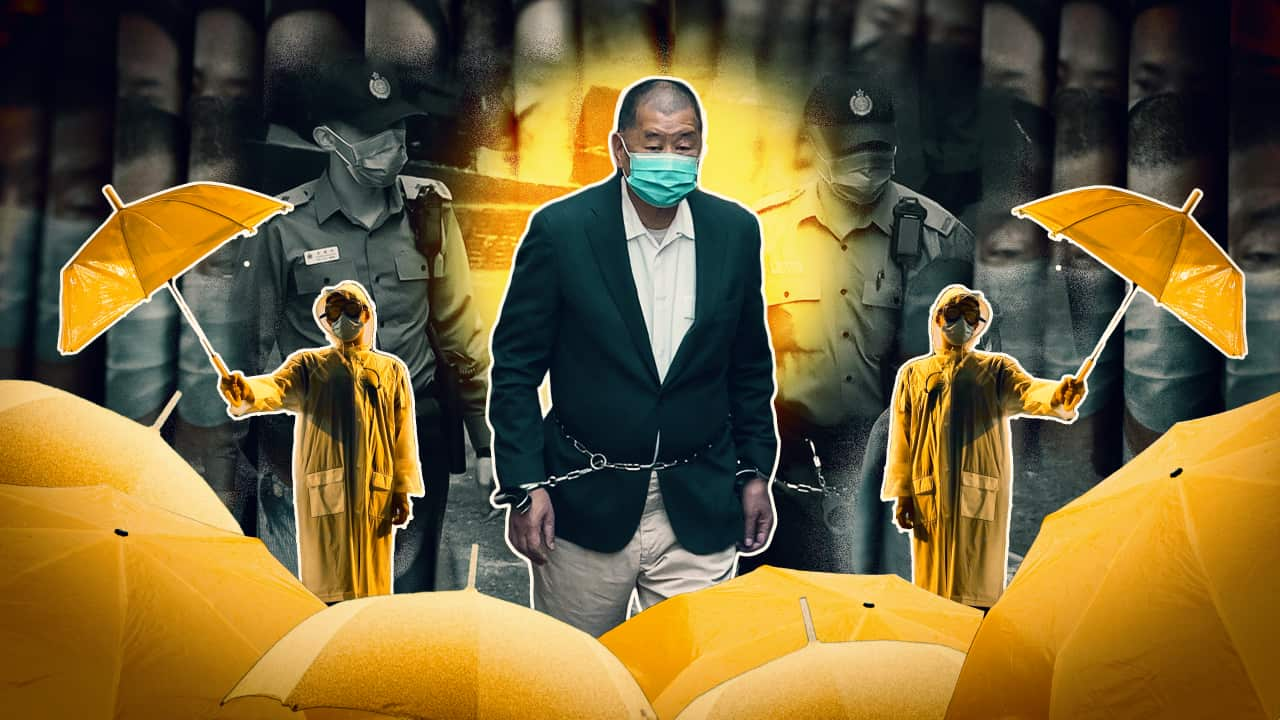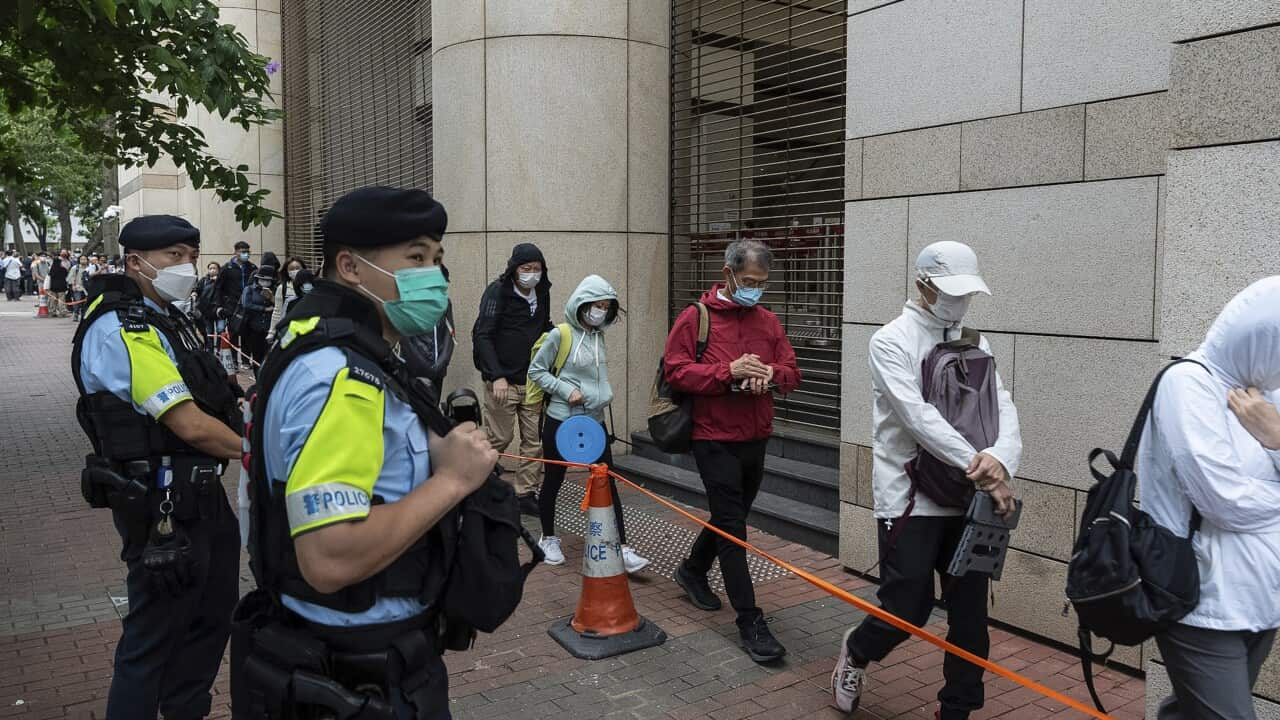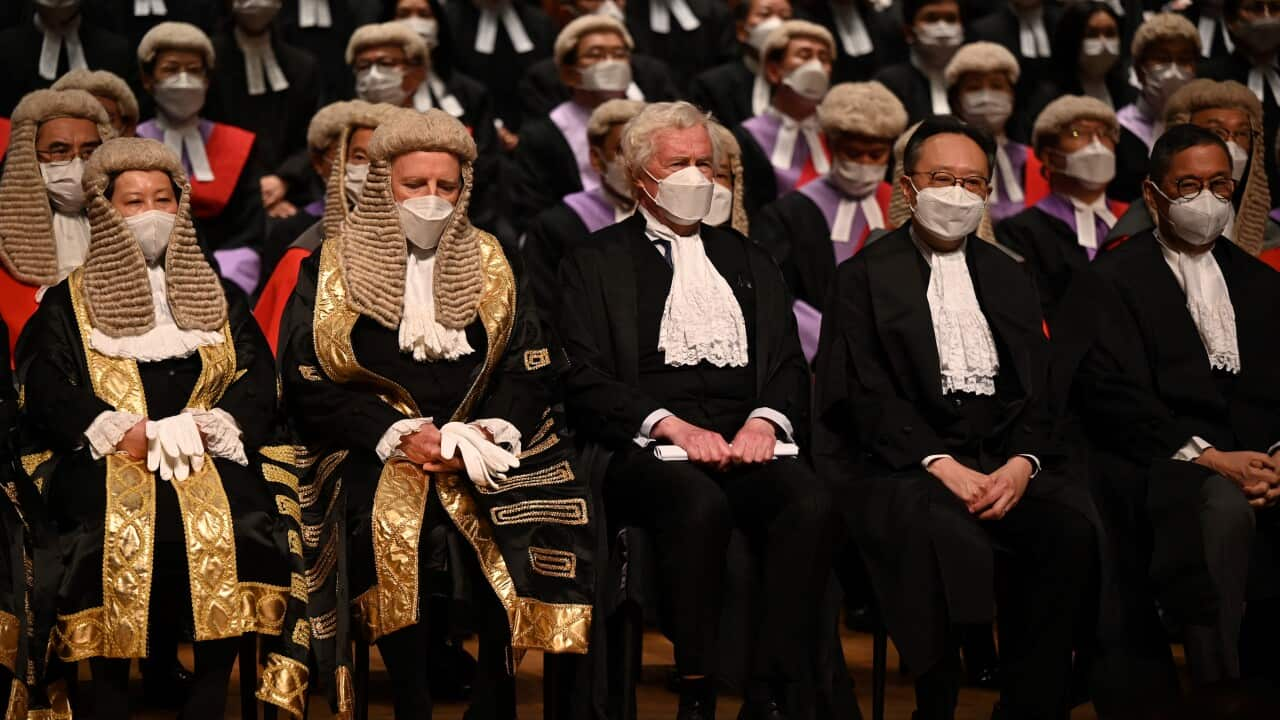Sebastien Lai’s first memory of his father’s pro-democracy activism was at a vigil for victims of the Tiananmen Square massacre when he was a child.
He remembers cupping a candle between his hands and standing shoulder to shoulder in solidarity with others who, like his father, had been spurred into activism by the . Every year they would gather to commemorate the day Chinese soldiers opened fire on protesters congregating in Beijing, demanding political and economic reforms.
"Dad left Communist China on a boat as a stowaway when he was 12 years old," Lai tells SBS News.
"He knew no one in Hong Kong when he arrived but, as he tells it — even though he had nothing — it was one of the happiest moments of his life because he knew that he had a future because Hong Kong had the freedoms that China didn’t.
"He knew that it was important to defend it … that’s what he was always fighting for."

Jimmy Lai (right) attends a vigil in 2015 to mark the anniversary of the 1989 Tiananmen Square Crackdown. Credit: Lucas Schifres/Getty Images
Hong Kong, a former British colony, was in 1997. The civil liberties and freedoms enjoyed in the special administrative region were to be preserved for at least 50 years under the "one country, two systems" framework, however, Beijing has made increasing efforts to control Hong Kong’s political system and silence dissent in the less than 30 years since.

Jimmy Lai escaped Maoist China as a stowaway on a fishing boat. Credit: South China Morning Post/Getty
He was first arrested during the Umbrella Movement of 2014 when tens of thousands of people took to the streets and staged a months-long sit-in in protest against the Chinese government's plan to restrict elections.
"I still remember in 2014 when they started using tear gas and pepper spray, hence the umbrellas [for protection]," his son recalls.
"Dad was always on the front line, he would tell people to be peaceful … he was not a mastermind, he was someone who always advocated for peace.
"He did everything in the last 30 years simply because it was the right thing to do, and there were no nefarious benefits unless you call democracy a nefarious benefit."
While Jimmy Lai was later released, it would not be the last time he faced imprisonment for his activism.
A decade since the Umbrella Movement
Alex Chow was a student in Hong Kong in 2014 and the former secretary-general of the Hong Kong Federation of Students, known as one of the leaders of the Umbrella Movement.

Alex Chow (centre) with other pro-democracy protesters at Hong Kong International Airport before a flight to Beijing to meet with Chinese authorities in November 2014. Source: AFP / Alex Ogle/via Getty Images
Chow and thousands of fellow students were staked out for days on end, calling for universal suffrage — allowing Hong Kongers to vote for both Hong Kong’s chief executive and its legislative council — which had been promised under the Hong Kong Basic Law (governing laws that came into effect after the 1997 handover).
The first-ever universal suffrage election for chief executive was due to be held in 2017, but in mid-2014, Beijing issued a decree that candidates must be approved by the Chinese Communist Party and endorsed by the existing chief executive election committee — negating genuine universal suffrage.
"During the Umbrella Movement [and] during the occupation, we saw a lot of ordinary people — Hong Kongers young and old — really taking into consideration the city's future.
"[They were] daring to take part in the occupation, thinking about how their individual and collective contribution might really change the trajectory of the city."
It is basic human rights, it is basic political rights.Alex Chow
The 79-day occupation officially ended on 15 December 2014.
This week marks the 10-year anniversary of its beginning. Chow now lives in exile in the US and is the chair of the Board of the Hong Kong Democracy Council.
"I think 10 years on, the way we describe Hong Kongers is 'diaspora', 'exile', 'homeless people', 'stateless people'," he says.
"The experience of being in exile … is a really torturing process: it’s a mental shock, a psychological shock, a social shock.
"I really hope that Hong Kongers stay resilient, stay committed … I hope eventually Hong Kongers would be able to return to their homeland."

Pro-democracy protesters in Hong Kong in November 2014. Source: NurPhoto / Getty Images
"The Umbrella Movement may not have helped Hong Kong to achieve democracy, but it was a human coming together of enormous significance to that community," he tells SBS News.
In the last two decades, Clift says Hong Kong's civil liberties have been eroded.
"Hong Kong has a semblance of democracy today, but it is what we might call a fake democracy," he says.
"It has a legislative council, a parliament, [which] has 90 seats, but only 20 of those seats are up for direct election by the people. And the candidates for those seats are vetted in advance by the Hong Kong government."

Police fire tear gas on pro-democracy demonstrators near the Hong Kong government headquarters in September 2014,
"The SAR Government strongly condemns anyone who continues to glorify and honour these irresponsible and illegal behaviours."
A ‘primary target’
While the Umbrella Movement did not achieve its goal of protecting suffrage, many credit it as being the inspiration behind the in 2019 and 2020, where Hong Kongers demonstrated against a proposed extradition bill from the special autonomous region to mainland China.
According to protest organisers, at least 1.7 million people participated — approximately a quarter of Hong Kong’s population. Jimmy Lai was among them.
Their protests were met with sweeping national security laws, first imposed by Beijing in 2020 and followed by Hong Kong's implementation of Article 23 this year, a move the government said was needed to promote stability.
The law covers crimes such as treason, sedition, espionage, theft of state secrets, and external interference and allows for trials to be held behind closed doors.

Hong Kongers again took to the streets in protest in 2019 and 2020. Source: NurPhoto / NurPhoto/Getty Images
"Our house has been firebombed; there were people who were following him for years … he had multiple threats [and] businesses were asked to boycott Apple Daily.
"When the national security law came down, everyone knew he would be one of the main targets and everyone around him told him to leave.
"He had a British passport … but his journalists and a lot of the people who campaigned with him probably wouldn’t be able to [leave], so he stayed and acted as a lightning rod. That is what he is being punished for now."
According to Clift, most prosecutions by authorities have focused on high-profile individuals.
"The Beijing and Hong Kong governments have had a pattern of identifying people they see as figureheads and targeting them to send a signal," he tells SBS News.
"Benny Tai, the well-known pro-democracy academic and Jimmy Lai, the media mogul — they were both involved from an early stage in the Umbrella Movement and they continued to be important members in Hong Kong's pro-democracy movement.
"But these were grassroots movements: they didn't really have figureheads. They were made up of the millions of Hong Kongers who were willing to take to the streets."
He stayed and acted as a lightning rod. That is what he is being punished for now.Sebastien Lai, on his father Jimmy Lai
Jimmy Lai was arrested in August 2020 and has since been held in a maximum-security prison in Hong Kong on a number of charges under the national security law.
"They’re drawing out his trial and it’s inhumane because, at almost 77, he is being kept in a cell in solitary confinement for more than 1300 days; he doesn’t get any natural light," Sebastien says.
"Hong Kong is like Australia, it could be up to 30-40 degrees Celsius: he’s baking in there some days.
"They are slowly but surely killing him."
‘The weaponisation of law’
According to estimates by the Hong Kong Democracy Council, there are currently more than 1,800 political prisoners in Hong Kong.
Jimmy Lai’s international legal team led by Caoilfhionn Gallagher— a barrister at Doughty Street Chambers in London — has filed an urgent appeal to the United Nations Special Rapporteur on Torture.

Jimmy Lai (centre) leaving Hong Kong's Court of Final Appeal on 9 February 2021. Source: AAP / Kin Cheung/AP
"What we're now seeing over the last five years has been the weaponisation of law to try to silence him; to shut down his newspaper, which they've succeeded in doing.
"We're worried that they're now doing all they can to break him, the man too."
In response to SBS’s enquiry, the Hong Kong government said: "As the legal proceedings involving Jimmy Lai are still ongoing, it is inappropriate for anyone to comment on the case.”

A treasured photograph of a young Sebastien Lai and his father, Jimmy. Source: AFP / I-hwa Cheng/AFP/Getty Images
"We've been subjected to threats in state-run media," Gallagher tells SBS News.
"I've been called an enemy of the people in state-run media in formal press releases released by the Hong Kong authorities. They've called us criminals for bringing a human rights case to UN bodies.
"If they're willing to do this against the lawyers, just think about how much they want to silence our client … we do not want to see Jimmy Lai die behind bars for being a journalist, and the world has got to step up and act before it's too late."
As for Sebastien, he has not seen his father for four years but says he holds on to hope that they will one day be reunited.
"In these situations where your life is at risk, do you choose the comfortable road or do you choose what is right?" Lai asks.
"[Dad] knew he had a responsibility to his people and he carried it out … I’m immensely proud that he did that; he did what was right all the way through."
This story was produced in collaboration with SBS Cantonese.












